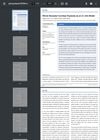106 citations,
February 2014 in “eLife” Lanceolate complexes in mouse hair follicles are essential for touch and depend on specific cells for maintenance and regeneration.
91 citations,
December 2006 in “Proceedings of the National Academy of Sciences” Hair patterns in mice are controlled by both a global system dependent on Fz6 and a local self-organizing system.
[object Object] 71 citations,
January 2012 in “PloS one” The conclusion is that genetic differences affect how the cochlea heals after hair cell loss, which may challenge the creation of hearing loss treatments.
34 citations,
February 2015 in “Frontiers in Cellular Neuroscience” Zebrafish helped find new ways to prevent drug-induced hair cell death and potential treatments for hearing loss.
 15 citations,
June 2019 in “eLife”
15 citations,
June 2019 in “eLife” Activin A and follistatin control when hair cells develop in mouse ears.
 5 citations,
November 2021 in “Frontiers in Cell and Developmental Biology”
5 citations,
November 2021 in “Frontiers in Cell and Developmental Biology” Caffeine can damage hearing cells and affect hearing recovery after ear trauma.
 2 citations,
January 2023 in “Redox Report”
2 citations,
January 2023 in “Redox Report” Estradiol may protect ear cells from hearing loss caused by a chemotherapy drug by activating a protective pathway.
 1 citations,
July 2023 in “Journal of visualized experiments”
1 citations,
July 2023 in “Journal of visualized experiments” The new method makes it easier to study the whole cochlea from newborn mice and rats in the lab.

Activin A and follistatin control when ear hair cells form in mice.
[object Object] 
Activin A promotes ear hair cell development, while follistatin delays it.
February 2023 in “Pharmaceutics”  11 citations,
April 2017 in “Journal of The European Academy of Dermatology and Venereology”
11 citations,
April 2017 in “Journal of The European Academy of Dermatology and Venereology” Found different long non-coding RNAs in balding Chinese men, which may help create new treatments.






